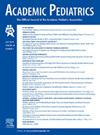主任奖学金:在学术儿科教育领导的新水平。
IF 3
3区 医学
Q1 PEDIATRICS
引用次数: 0
摘要
背景:一个部门的教育领导作用,主任奖学金(DF),已经出现在学术儿科部门,以帮助亚专科项目支持。人口统计、工作职责和挑战没有被充分描述,因此可能会被低估。方法:通过儿科项目主任协会列表服务向临床医生发放电子调查问卷。对自由文本进行描述性统计和专题分析。结果:有效率36/54(67%)。大多数博士是女性(75%),临床实践中位数为15年(IQR 12.5-20), 10年(IQR 7-13)年担任奖学金项目领导,39%接受过高等教育培训。主要职责包括监督奖学金核心课程,奖学金项目主任的师资发展,协助绩效问题,以及协调共同的奖学金活动。挑战在于社区对DF角色的理解有限;时间/资源不足;以及不同的团契需求。预期的结果包括资源的集中和宣传、教育创新、FPDs、研究员和协调员之间更大的可见度/加强的社区。结论:博士学位越来越普遍,填补了医学研究生教育的重要空白。担任这个角色的个人提供必要的专业知识和管理中心资源,这可以打破团契的藩篱。然而,支持是可变的,制度影响没有得到充分研究。本文章由计算机程序翻译,如有差异,请以英文原文为准。
Director of Fellowships: A New Level of Educational Leadership in Academic Pediatric Departments
Objective
A departmental educational leadership role, Director of Fellowships (DF), has emerged in academic pediatric departments to aid in subspecialty programmatic support. Demographics, job responsibilities, and challenges are not fully described and thus may be underappreciated.
Methods
An electronic survey was distributed to DFs through the Association of Pediatric Program Directors listserv. Descriptive statistics and thematic analysis of free text were performed.
Results
Response rate was 36/54 (67%). Most DFs were female (75%) and were in clinical practice for a median of 15 (interquartile range 12.5–20) years with 10 (interquartile range 7–13) years in fellowship program leadership and 39% with advanced training in education. The main responsibilities included oversight of fellowship core curriculum, faculty development of fellowship program directors, assistance with performance issues, and coordination of common fellowship events. Challenges were limited community understanding of DF role; insufficient time/resources; and disparate fellowship needs. Perceived outcomes included centralization of and advocacy for resources, educational innovation, and greater visibility/enhanced community among fellowship program directors, fellows, and coordinators.
Conclusions
DFs are increasingly widespread, filling important gaps in graduate medical education. Individuals in this role provide necessary expertise and management of central resources, which can break down fellowship silos. However, support is variable and institutional impact is understudied.
求助全文
通过发布文献求助,成功后即可免费获取论文全文。
去求助
来源期刊

Academic Pediatrics
PEDIATRICS-
CiteScore
4.60
自引率
12.90%
发文量
300
审稿时长
60 days
期刊介绍:
Academic Pediatrics, the official journal of the Academic Pediatric Association, is a peer-reviewed publication whose purpose is to strengthen the research and educational base of academic general pediatrics. The journal provides leadership in pediatric education, research, patient care and advocacy. Content areas include pediatric education, emergency medicine, injury, abuse, behavioral pediatrics, holistic medicine, child health services and health policy,and the environment. The journal provides an active forum for the presentation of pediatric educational research in diverse settings, involving medical students, residents, fellows, and practicing professionals. The journal also emphasizes important research relating to the quality of child health care, health care policy, and the organization of child health services. It also includes systematic reviews of primary care interventions and important methodologic papers to aid research in child health and education.
 求助内容:
求助内容: 应助结果提醒方式:
应助结果提醒方式:


